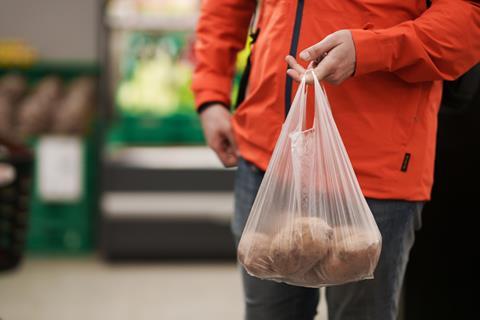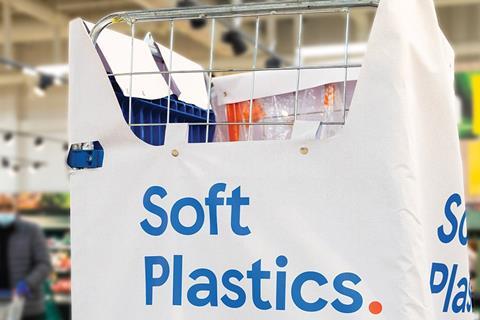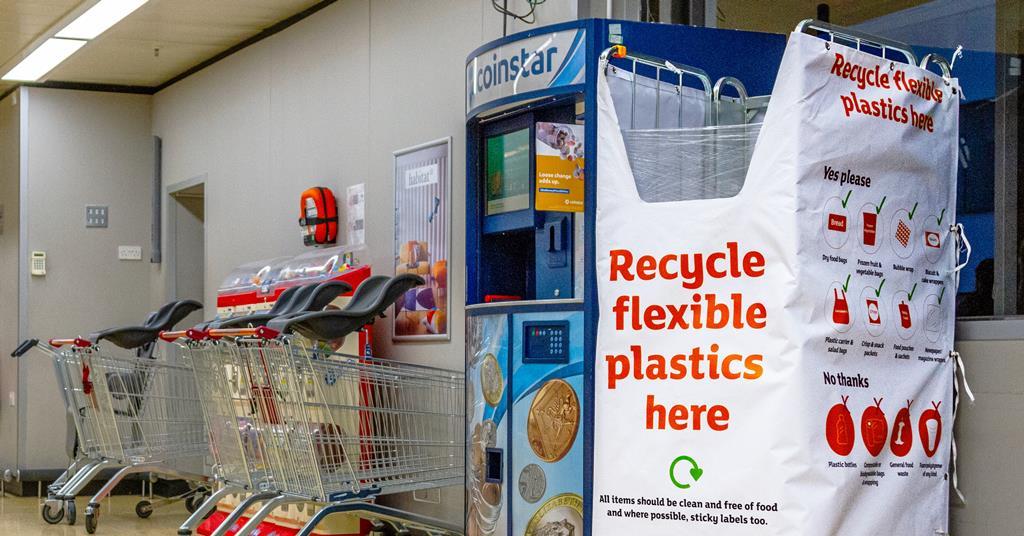Campaigners are calling for Tesco and Sainsbury’s to back global plastic reduction targets after finding much of the soft plastic left in their in-store recycling points ended up burnt.
Campaign Group Everyday Plastic and the Environmental Investigation Agency put tracking devices in 40 bundles of soft plastic packaging left in collection points at Tesco and Sainsbury’ supermarkets to see where they ended up between July 2023 and February 2024.
Of the tracked soft plastic packaging waste collected for recycling at Sainsbury’s and Tesco stores, 70% that reached a known destination was burnt, according to the groups.
The rest is said to have ended up at recycling facilities that downcycle soft plastic waste into lower value products, the majority of which were in Turkey.
Everyday Plastic and EIA are calling for Sainsbury’s and Tesco to “publicly and urgently” support a 40% cut in global plastic production by 2040.
They want the supermarkets to back their call on the UK government to support the same target at Global Plastics Treaty negotiations.
Collectively, the tracked bundles of soft plastic were found to have travelled over 15,000 miles, according to the campaigners’ report, called The Hard Truth About Soft Plastic.
Out of the bundles that are known to have reached a final destination, seven were turned into fuel pellets, five were burnt for energy, four were downcycled overseas and only one was downcycled in the UK, according to the report.
Eight of the tracked bundles are confirmed to have been sent overseas.
Environmental law NGO ClientEarth has claimed the findings show supermarkets are misleading customers with on-pack labelling saying ‘Recycle with bags at large supermarkets’.
“Our trackers reveal the hard truth about soft plastic recycling schemes at supermarkets – soft plastic packaging is not getting recycled,” said Everyday Plastic research director Alison Colclough.
“The majority of the bundles of soft plastic we tracked ended up being burned for energy recovery – a solution that is being deployed more and more in order to deal with the unmanageable amount of plastic waste.
“Supermarkets, waste companies and the government acknowledge that there are significant challenges to recycling soft plastic.
“Our tracker investigation supports these claims and shows that soft plastic is extremely difficult, if not impossible, to recycle at scale.
“The take-back schemes are being presented as a solution, which is diverting attention from the main issue that can’t be overlooked: far too much unnecessary plastic packaging is being produced.”

A Tesco spokesperson said: “We have a clear plan to remove packaging wherever possible and reducing, reusing and recycling it where we can’t.
“Given the challenges of collecting soft plastics at kerbside, we have soft plastics collection points in our stores for customers. We work hard to recycle the materials we collect, for example our bags for life, and in some cases we are even able to use it for projects such as fruit and vegetable planters donated to schools or park benches donated to the NHS.
“Where it is not possible to recycle the collected plastic, we put it to alternative uses to avoid these materials going to landfill, for example using it for energy recovery.
“We know there is a lot more progress to be made, and the infrastructure to recycle soft plastics at scale in the UK and the EU still has a way to go. We are committed to working constructively with the industry and government to find new solutions for all materials, including those previously considered waste.”
Read more:
A Sainsbury’s spokesperson said: “We’re always seeking ways to positively manage the end-of-life of our packaging. Our ‘return to store recycling scheme’ provides the opportunity to recycle more soft plastic until kerbside collection becomes available in 2026/27.
“We collect a small volume of flexible plastic overall in-store. The majority is in good condition and so is recycled. However, when materials are soiled or damaged, then they may need to be converted for energy, which is managed by our supplier.
“Feedback is important to us and we’d welcome any suggestions on how we can improve our efforts in this area.”
Sainsbury’s also said it had recently improved signage to help and encourage customers to recycle flexible plastics, including more information about which items are accepted and the condition they should ideally be in to enable recycling, including free from food. It said this would improve sorting of plastics after leaving stores, which in turn should result in a smaller percentage of materials being incinerated for energy.

Helen Bird, head of materials systems transformation at WRAP, said: “For something to be ‘recyclable’, it must be designed for recycling as well as collected, processed and remanufactured at scale. Ahead of ‘soft’ plastic recycling directly from our homes, due before 2028, supermarkets stepped up to provide collection points to fill this gap.
“While not perfect, these have acted as an important catalyst for crucial investment in UK recycling infrastructure and end markets and instilled new habits in people to separate bags and wrapping for recycling.
“Much of this material is being recycled into products such as refuse sacks and street furniture, as well as new packaging including Heinz beans ‘snap pots’, Cadbury Dairy Milk, Kingsmill 50/50 and Nestle’s Kit Kat. But it’s a complex situation.
“Too much packaging is made from different types of plastics that are difficult to recycle and the end market is not stable. More transparency is needed to provide confidence to people of what’s happening to the collected materials.
“But there is one thing for certain: if it doesn’t get placed in the recycling, it will not get recycled.”

